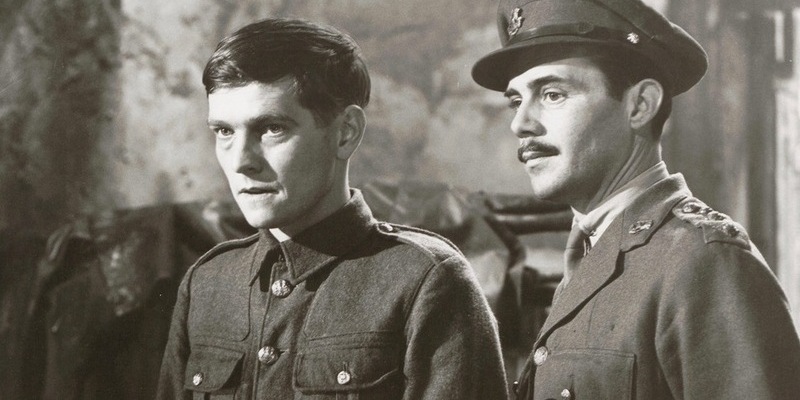
Review by
Eric Hillis
Directed by: Joseph Losey
Starring: Tom Courtenay, Dirk Bogarde, Leo McKern, Barry Foster, Peter Copley,
James Villers

Like Kubrick's
Paths of Glory, Joseph Losey's 1964 film King and Country is
centred on a WWI trial for cowardice. It has a similar basic setup, with
an officer pleading the case for one of his men accused of desertion,
but there are some key differences. While not entirely as impactful as
Kubrick's film, this is a far grittier, far more unflinching take on the
idea. Where Kubrick's Hollywood production passed the buck to the French
army, this British production doesn't shirk from highlighting the
cruelty of its own military.
Adapted by screenwriter Evan Jones from a play by
John Wilson, itself based on a book by
James Lansdale Hodson, King and Country takes us
deep into the British trenches at Passchendaele. There we find a man
confined to a makeshift prison. Private Arthur Hamp (Tom Courtenay) awaits trial for desertion, having left his post and begun walking to
England only to be picked up by police at the French coast. Assigned to
his defence is Captain Charles Hargreaves (Dirk Bogarde). Hamp
naively believes he'll escape execution because of his service record,
having been the only survivor of a previous posting that wiped out the
rest of his platoon. Hargreaves lets him know in no uncertain terms that
he will most likely face the firing squad, but that he'll do his best to
ensure he gets a fair trial.

The trial sees the working class, poorly educated Hamp brought before a
panel of men who are far from his peers, three officers of blueblood
stock who barely view him as a human. In another area of the trenches a
group of soldiers are simultaneously conducting a mock trial for a rat
accused of biting a chunk out of one of the men's ears. As both trials
progress it becomes clear that the rat stands a better chance than
Hamp.
A young Courtenay is outstanding as Hamp. He plays the part in an
ambiguous fashion that leaves us to guess whether he's feigning
ignorance or is simply that innocent regarding the brutality of the
military and its rules, or whether perhaps he's suffering shellshock.
Hargreaves attempts to centre his defence around the latter idea, but is
scuppered by a gruff doctor (Leo McKern) who dismisses the idea.
When Hargreaves mentions "mental health," he's scoffed at by the panel
of judges, a reminder of how that concept was viewed until quite
recently.

Most war movies push the idea of men finding brotherhood among their
fellow soldiers, but Losey has no time for such a romantic notion.
Hamp's fellow privates don't seem to care about the outcome of his
trial, and when he tells Hargreaves of how he almost died in a muddy
sinkhole he confesses surprise at being rescued, having seen another man
die in a similar scenario as his fellow soldiers watched him disappear
into the mud. When a party is thrown for the condemned man the drunken
soldiers fight among themselves over the last jug of wine, and Hamp is
blindfolded and teased in a cruel mockery of his impending fate. We're
left in no doubt that none of these men will think twice about putting a
bullet in Hamp's chest if they're selected to join a firing squad. War
has turned these young men into the stranded schoolboys of Lord of the
Flies.
Conversely, despite having a heated debate during the trial, the
officers convene immediately after for very civilised tea and cake. For
them, the war is something for other men to fight as they keep
themselves warm and clean below ground. The commiserations given to
Hargreaves' always doomed defence are offered with the casual air of
sympathising with a friend whose football team just got knocked out of
the cup.

Losey doesn't have the sprawling sets Kubrick exploited so famously in
Paths of Glory but the Shepperton sets are no less
convincing. Losey employs a clever trick of opening scenes with genuine
photographs of the horrors of the trenches and dissolving into the
fictional drama. It works a treat, and by the end of the film the line
between reality and fiction has been blurred to an almost
indistinguishable degree. The sets are grimy, caked in mud and carpeted
with filthy water, with body parts poking out of walls and rats
scurrying everywhere. Despite its limited means it's one of the most
realistic depictions of the horrific conditions of trench warfare.
The image that will linger long after viewing is that of the faces of
Courtenay's Hamp and Bogarde's Hargreaves in their final gruesome
exchange. For the former it's one of disbelief at the coldness he's been
subjected to, but for the latter it's simply one of tired
resignation.

King and Country is on UK DVD,
bluray and VOD from November 6th.
